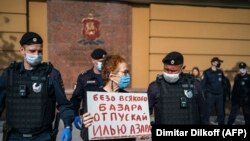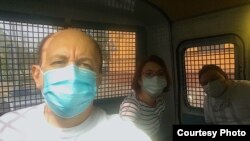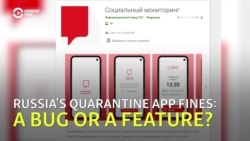Police detentions of lone protesters in Moscow and St. Petersburg have sparked accusations that the Russian government is using the COVID-19 pandemic to crack down on dissent by government critics and independent journalists, rather than on dissemination of the disease.
In the latest detention, law enforcement officers on May 29 detained an opposition deputy from the Moscow City Council, Sergei Mitrokhin, for staging a one-person protest outside Russia’s Interior Ministry against the earlier detention of a journalist, Ilya Azar, who, in turn, had been protesting the detention of an anti-corruption activist on criminal charges.
Moscow police maintain that the protests violate city regulations forbidding public gatherings during the coronavirus pandemic.
Mitrokhin, a 57-year-old member of the liberal Yabloko Party, had been standing for less than a minute with a poster that declared “No to police repression! Freedom for Ilya Azar!” when police took him away, the protest-watchdog group OVD.info reported. His assistant, Maria Chuprina, was also detained.
Over a dozen other people, including opposition Moscow City Council deputies, politicians, activists, and one city district manager, were later also detained.
The day before, on May 28, Moscow police had hauled in 10 people, including representatives of some of Russia’s few independent media outlets (MediaZonа Editor-in-Chief Sergei Smirnov, Ekho Moskvy radio reporter Tatyana Felgenhauer) for staging similar one-person protests оutside police headquarters in support of Azar.
Later, at the same location, other journalists were also detained: Ekho Moskvy reporter Aleksandr Plyushchev, Takikh Del Editor-in-Chief Anastasia Lotareva, photographer Viktoria Ivleva, writer Alisa Ganiyeva, TV Dozhd journalist Mikhail Fishman and an employee of the state-run RT television network, Ilya Vasyunin.
They were reportedly later released.
Non-journalists also attracted attention. On May 28, Moscow police interrupted Current Time’s live interview with a young man protesting Azar’s detention because he was, the arresting officer charged, staging “a public event.”
In St. Petersburg, at least seven people staging solo protests for Azar’s release in front of the downtown Gostiny Dvor shopping center were detained as well.
Azar, a reporter for the daily Novaya Gazeta, arguably one of the government’s most outspoken media critics, was detained on May 28 in Moscow and sentenced to 15 days in jail. He had been staging a one-person protest in Moscow against the detention of Vladimir Vorontsov, a prominent activist against police corruption, on criminal charges of allegedly extorting 300,000 rubles (about $4,256). Charges of allegedly trafficking in pornography have now also been brought against Voronstov and a colleague.
In detaining Azar’s supporters, Moscow police maintain that they were simply observing the rules for the capital city’s COVID-19 lockdown, which, they say, forbid any “public events,” including one-person protests. Mayor Sergei Sobyanin’s March 5, 2020 order prohibits people from leaving their residences except to buy food or medicine, see a doctor, or exercise pets. Though some stores and services have started to reopen, self-isolation will remain mandatory until June 14.
But while Moscow police are keeping a sharp eye out for protesters, they appear to take no such interest in the “enormous number” of people out strolling, also in defiance of the city’s quarantine, noted Novaya Gazeta political editor Kirill Martynov.
Detaining solo protesters looks “cynical to the nth degree,” Martynonv said, “because nearby are as many people as you like, and no one is asking for their residence permit and no one cares about what they’re doing.”
In reality, the detentions “have nothing to do with the law,” agreed lawyer Alkhas Abgadzhava, who blogs on civil-rights topics for radio station Ekho Moskvy.
“They basically feel now that they’re absolutely in their rights [to detain solo protesters] in the sense that we have some kind of special situation with the pandemic,” Abgadzhava said, referring to the city police. But, without an official state of emergency or curfew, “all of the authorities’ actions now forbidding solo pickets are absolutely against the law and anti-constitutional because we’re not in such a situation that a person cannot express his solo protest.”
With 387,623 cumulative cases so far, Russia currently has the third highest number of coronavirus infections in the world, after the United States and Brazil. Moscow accounts for roughly half of these cases, the Associated Press reported.
To control the spread of the disease, the city government has issued a social-monitoring app that is mandatory for COVID-19 patients. However, hundreds of allegedly groundless fines against patients for leaving their residences has spurred distrust of this pandemic measure as well. The city, which has collected roughly $3 million in fines to date, has canceled several hundred of the penalties, but declined to discuss the problem with Current Time.
Further challenges could still lie ahead.
How city police will justify detaining solo protesters after June 1, when public walks again become permissible, is unclear. Under the order, Muscovites will be allowed to take walks twice during the week and once on weekends, but only within 2 kilometers of the address where they have an official permit to live. A schedule will supposedly determine who walks at what times.
In interviews with Current Time, residents on May 28 scoffed at the notion of an official timetable or rules for these promenades.
Am unmasked, middle-aged woman relaxing on a bench with her dog called the decision “crap” reminiscent of the Nazi secret police. “Even Hitler didn’t behave like that,” she said, with a laugh.
“Maybe [the rule] has some kind of purpose,” conceded a young man with a shrug, “but people – most likely, including me – won’t follow it.”
“It’s like some kind of corral,” commented another young man, slightly grinning. “That is, it’s not serious. I’ll go wherever my spirit wants.”








Facebook Forum